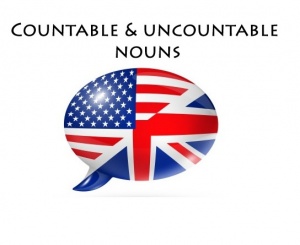Language/English/Grammar/Countable-and-Uncountable-Nouns
Countable and Uncountable Nouns
Welcome to our lesson on English Grammar → Countable and Uncountable Nouns! As an experienced English language teacher with 20 years of experience, I'm excited to help you master this essential aspect of English grammar. In this lesson, we will explore the differences between countable and uncountable nouns, and how to use them correctly in sentences. 📚
Once you've completed this lesson, you might also be interested in checking out some of our other related grammar lessons. For example, learn about the distinctions between prepositions like across, over, and through, or dive into the differences between the phrases "native of" and "native to". Additionally, you can clear up any confusion you may have between adjectives and adverbs in another helpful lesson. 😊
So, let's get started on our journey to mastering countable and uncountable nouns in English grammar!
Grammar Rules[edit | edit source]
A noun is a word that refers to person, place, thing, event, substance or quality; can be either countable or uncountable. Countable nouns have singular and plural forms while uncountable nouns can be used only in the singular form.
In English grammar, words that refer to people, places or things are called nouns. There are several ways to classify nouns. One way is whether they are countable (also known as count) or uncountable (also known as non-count) nouns. Countable nouns, as the term suggests, are things that can be counted.
They have singular and plural forms.
E.g.
table, tables; month, months; pen, pens. A countable noun becomes plural by adding s at the end of the word.
Of course, there are nouns that form plurals in other ways.
E.g.
• man, men; child, children; goose, geese.
In contrast, uncountable nouns cannot be counted. They have a singular form and do not have a plural form – you can’t add an s to it, e.g. dirt, rice, information and hair.
Some uncountable nouns are abstract nouns such as advice and knowledge.
E.g.
• Her jewellery is designed by a well-known designer.
• I needed some advice, so I went to see the counsellor.
Some nouns can be countable or uncountable depending on the context or situation.
E.g.
• We’ll have two coffees (countable).
• I don’t like coffee (uncountable).
There are two kinds of nouns: countable nouns and uncountable nouns.
Simple things you can count are countable nouns, for example, eggs. Countable nouns have plural forms, which usually end in -s. They also have singular forms. The singular nouns can have a or an before them.
Things you can't count are uncountable nouns; for example, milk. You can't count milk. With uncountable nouns, don't use plural -s or a or an. For example, uncountable noun rice, it is not correct to say rices or a rice.
Countable Nouns[edit | edit source]
Use "a/an" or plural "-s"[edit | edit source]
- I have an egg for breakfast everyday.
- I don´t eat bananas.
How many eggs do you eat a week?[edit | edit source]
- I eat a lot of eggs.
- I don´t eat many. (eggs)
- I don´t eat a lot of eggs.
Uncountable Nouns[edit | edit source]
Don't use "a/an" or plural "-s"[edit | edit source]
- I drink milk every morning.
- I don´t eat seafood.
How much milk do you drink a day?[edit | edit source]
- I drink a lot of milk.
- I don´t drink much. (milk)
- I don´t drink a lot of milk.
Video[edit | edit source]
Sources[edit | edit source]
Other Lessons[edit | edit source]
- More on Omission
- Express Past
- Beside and Besides
- How do you use Adjectives
- Present Tense
- Count noun
- Negations
- Actual and actually
- Grammar Gaffes (mistakes, errors)
- CONJUNCTIONS


